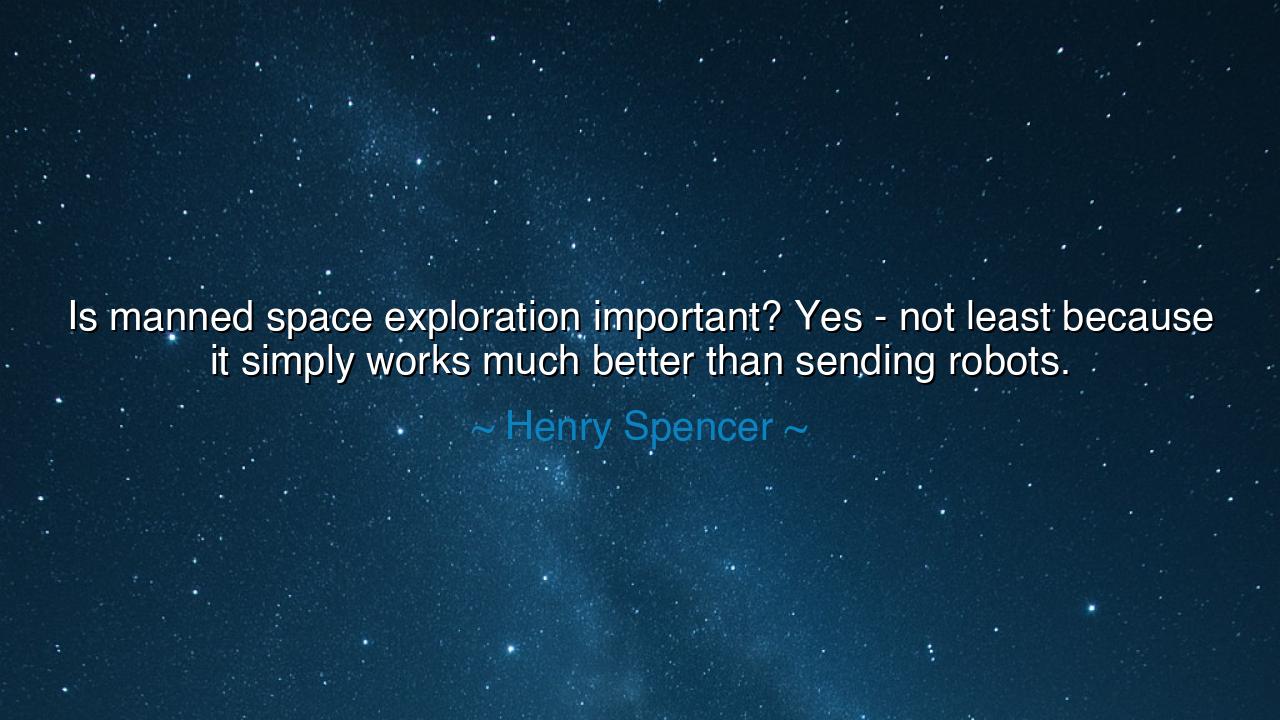
Is manned space exploration important? Yes - not least because it
Is manned space exploration important? Yes - not least because it simply works much better than sending robots.






Henry Spencer, thinker on the frontiers of technology and the cosmos, once declared with clarity: “Is manned space exploration important? Yes – not least because it simply works much better than sending robots.” Though spoken in the language of modern science, this is a saying that resounds with the eternal wisdom of the human spirit: that there is no substitute for the presence of a living soul, no machine that can rival the intuition, courage, and adaptability of a human being when confronting the unknown.
The meaning of Spencer’s words lies in the contrast between machine and man. Robots are efficient, unyielding, uncomplaining; they can endure harsh environments where flesh would falter. Yet their vision is narrow, their actions bounded by the commands written by distant minds. A human being, by contrast, carries not only intellect but imagination, not only logic but instinct, not only sensors but the living breath of curiosity. In the crucible of the unexpected—the snapped cable, the unforeseen storm, the sudden mystery—only a human can rise in that moment, adapt, improvise, and overcome. Thus, Spencer reminds us that the human presence is irreplaceable.
The origin of this truth lies in the history of exploration itself. When Columbus crossed the ocean, no automaton could have altered course by instinct, no machine could have calmed fearful sailors or navigated storms with a captain’s judgment. When Edmund Hillary stood atop Everest, no lifeless device could have pressed upward through the thin air with the sheer stubborn will of a climber’s heart. Likewise in space, when Apollo 13’s oxygen tank exploded, it was not cold circuitry but living minds—astronauts improvising in the capsule, engineers toiling on Earth—that brought the crew safely home. It was humanity itself, not machinery, that turned disaster into survival.
Consider too the story of Apollo 11. The lunar module descended toward the Moon’s surface when Neil Armstrong realized the computer was guiding them into a field of boulders. In that moment, it was not programming but human judgment that saved the mission. Armstrong seized manual control, piloted the craft past the rocks, and landed with seconds of fuel remaining. A robot would have crashed. A man walked on the Moon. This is what Spencer means when he says that manned exploration “works better”: the human capacity for awareness, improvisation, and choice cannot yet be replaced.
Yet Spencer’s words are not a dismissal of machines, but a reminder of proportion. Robots extend our reach, they scout the terrain, they gather the data—but it is humans who give meaning to discovery. A rover may send back images of Mars, but when men and women walk its deserts, the red world will cease to be a picture on a screen and become part of human experience. It is not only about efficiency; it is about significance. For the cosmos is not conquered by machines—it is entered, inhabited, and claimed by humanity itself.
O children of tomorrow, learn this well: do not leave your destiny to machines. Use them, yes, as tools, as companions, as servants of exploration. But remember always that it is the human mind, the human heart, the human spirit that must take the step into the unknown. For without the living presence of mankind, space will remain forever distant, a cold theater watched through glass. With us, it becomes a new home, a new chapter in the great story of our race.
Therefore, the lesson is clear: seek the stars not only with instruments, but with your own flesh and will. Prepare yourselves to be the explorers, the settlers, the bridge between Earth and the heavens. Let robots pave the way, but let men and women walk the path. For as Spencer teaches, it is in our presence, our adaptability, our courage that the great work of exploration truly “works.”
Thus his words endure as a call to courage: “Is manned space exploration important? Yes – not least because it simply works much better than sending robots.” Let them remind you that while machines may assist us, it is humanity itself that must rise, step beyond the cradle of Earth, and claim its place among the stars.






AAdministratorAdministrator
Welcome, honored guests. Please leave a comment, we will respond soon